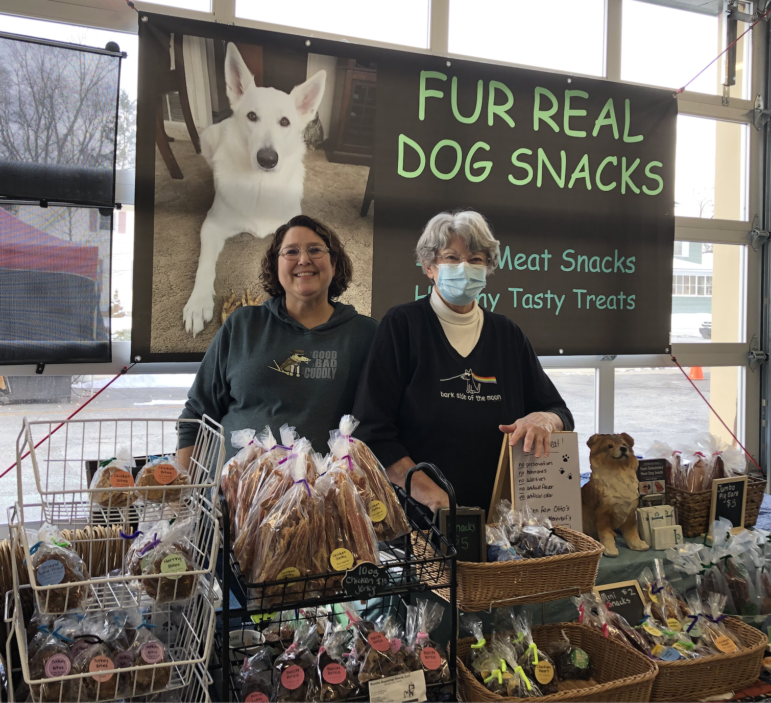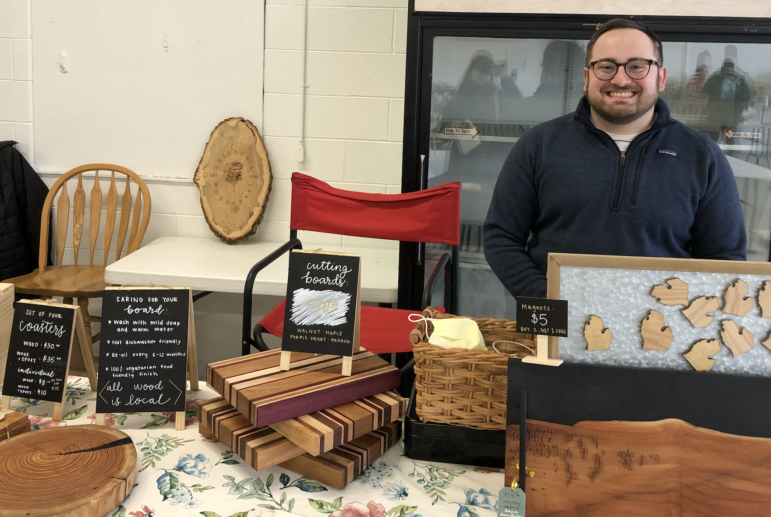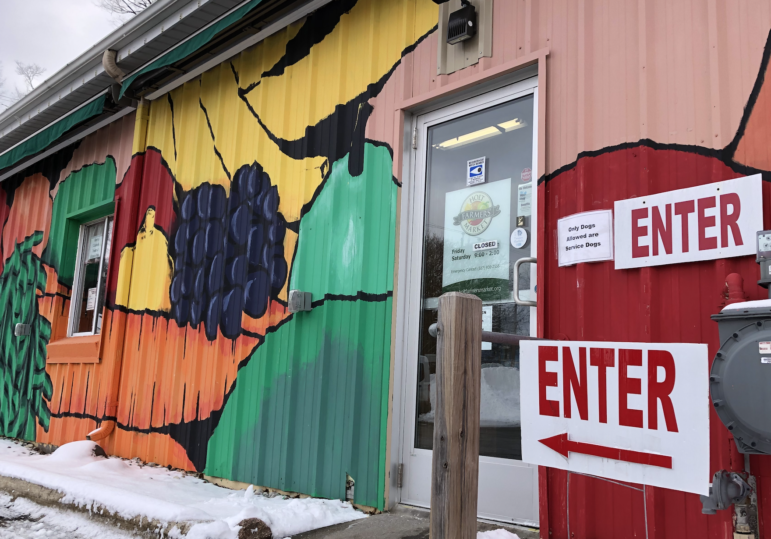
Picture this: you wake up on a Saturday between 9 a.m. and 2 p.m. You are absolutely famished, yet decidedly walk past the fridge and go outside. You find yourself at the brightly muraled entrance of the Holt Farmers’ Market. You walk in and are greeted with neighborly smiles and homegrown charm.
Located in the old fire department building, the Holt Farmers’ Market has been operating for the past 14 years under Director Chuck Grinnell. It is the only year-round farm market in the Greater Lansing Area.
“I started the market for the township 14 years ago because, well, they asked me to do it. I was a supervisor at the fire department and sat on all the boards. They had been talking about doing a farm market and we had our whole fire station available, so we decided to use that and start our farm market here,” said Grinnell.
Year-round operations require a year-round commitment. The market employs two other part-time workers who help maintain the facility, as well as the website and social media.
“About the time we started this, in all the little towns everybody wanted a farm market. And so, the first couple years that we were open there were over 300 farm markets that opened new in Michigan. Now we’ve lost better than half of those already,” said Grinnell.

Grinnell attributes The Holt market’s success to the yearly budget of $100,000-$125,000 received from the Downtown Development Authority.
“We are super fortunate because our farm market is sponsored by our DDA. And we are not a small town, but we are not a big town, either. We had a decent budget, and the DDA recognized the value to our community having a space like this, especially on our district corridor, and a lot—a lot of people wanted it. And so, they and the board were willing to invest the money to build us a nice farm market here and so that really is why we’ve been able to sustain ourself because we’ve always had that money behind us, and everything takes money,” said Grinnell.
Vendors pay $50 a month or $12.50 a day, depending on how often they plan on selling at the market. The budget goes toward keeping vendor fees low, payroll and events throughout the year.
“I don’t know how many people can say that they love their job, but I do love my job. It allows me to help a small businessperson to nurture their business and build their customer base and really help them grow at something that they want to and desire to do,” said Grinnell.

“It’s fun to take somebody and just watch them grow. I’ve had a number of them that have come in here with an idea and a desire and they’ve gotten so big,” said Grinnell, gesturing around the room.
“This gal here started off with me doing baked goods 13 years ago, now she does seven farm markets and owns her own restaurant. So that’s the success story right there, so it’s fun as hell to watch that happen and just know that you had a little bit in that, of helping the person, obviously they had to get off their butt and do it,” said Grinnell.
While many vendors have found success through the market, profits are often not the only factor in their participation. Since before the pandemic, many have found solace in the social aspect of the market, as well as the community and connections it provides.
Christy Davis, a representative of Grand Traverse Sauce Company who sells at the market about once a month, said “My kiddo is over there selling Girl Scout Cookies but usually she sells with me, and we love it. It’s just a lot of fun—it gives her experience talking to grownups and it gives me something fun to do and learn about, learning about the different peppers and Scoville heat index and everything.”
Farm markets provide small business owners an opportunity to start a passion project without fear of making poor investments. Markets like the one in Holt, allow vendors to trial run their business on local clientele and build customer loyalty without added expenses such as rent.
Katrina Jeffreys has been selling Fur Real Dog Snacks dehydrated meat dog treats at the Holt market every Saturday for four years. Now, her company Fur Real Dog Snacks also sells at other markets including the LFA markets in Mason and Williamston, the REO Town marketplace, as well as Joey’s Pet Outfitters in Williamston.
“We started at the farmers market because that was my way of getting kind of like a grassroots people, where people go to farmers markets and they expect to have handmade products, homemade products, products that you don’t normally find in a store, direct from the seller. They can explain to you their process, so I can actually speak with my customers and tell them how I do things, as compared to just putting it in a store and having people just look at it and wonder what it is. So, starting here at the farmers market was actually a launching point for us to get local clientele to see what we do and then just expand from there. So, it was just kind of a no-brainer to start at the farm market,” said Katrina Jeffreys of Fur Real Dog Snacks.
For vendors like Jeffreys, the market has become an invaluable networking tool, introducing her company, Fur Real Dog Snacks to people in industry, possible vendors, opportunities for custom work and growth as well as potential business partners.
“From our contacts here, we were able to connect with a bison farm in St. Johns. We also got connected next door to Otto’s Chicken, so we purchase our chicken from a vendor here, as well as Lonesome Pines Beef and Pork over there. So through our connections here and meeting mostly Holt residents that come in and other business owners we have been able to expand our business quite a bit,” said Jeffreys.
A former business owner himself, Grinnell can help vendors navigate the issues that come with starting a small business. The market provides vendors an opportunity to learn from
each other’s experiences, while connecting them to a community of passionate people who have the same goals.
“They all look out for each other, they all promote each other and as corny as it sounds, for the most part it’s a big happy family. And they all look forward to being here every Saturday—I mean who wants to waste their Saturday?” says Grinnell.
Passion produces passion, and while the market has generated a strong community of vendors, the relationships among the businesses and the local community are even stronger.
Jeffreys said, “The clientele is absolutely fantastic. We have met, I don’t want to call them customers, they’re friends. We see them every Saturday and we are to the point now with some of our customers that we greet them with hugs, and we know their dogs, and we know their story and honestly if I wasn’t here every Saturday I would miss—miss my friends you know? They just turned into just someone that buys a snack every week to someone that we have just connected with, and I don’t think I would ever not want to be here.”
Interested in becoming a vendor? Click here